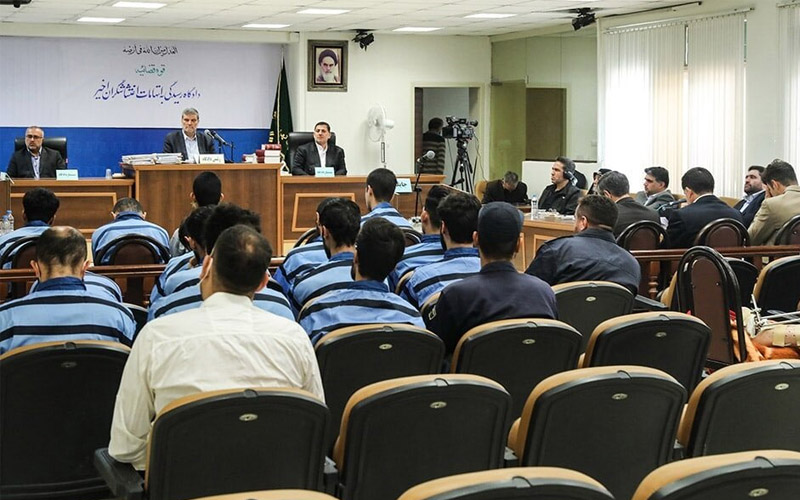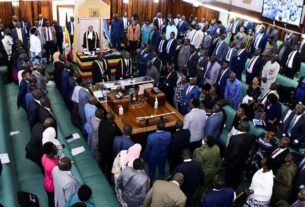With more than four months into Iran’s latest round of nationwide uprisings, the brutality of the Iranian regime’s security and judiciary apparatus has caused outrage and condemnation around the world. Politicians, lawmakers, and human rights activists and organizations are calling on Tehran to respect the human rights of civilians and to stop the torture and execution of detained protesters. However, the regime is refraining from coming clean on what is happening inside its prisons and is instead giving falsified reports to conceal the reality of the human catastrophe happening in Iran’s prisons.
The Iranian regime’s judiciary spokesperson claimed to have released a total of 5,200 people arrested during nationwide protests and about 98 percent of those arrested in Tehran province. But he once again refused to provide the total number of arrests in the last four months.
In a press conference on Wednesday, January 18, Massoud Setayeshi, who previously announced the release of 1,200 arrested protesters across the country, said, “Recently, about 4,000 people were granted legal concessions and were released from prisons throughout the country.”
Setayeshi did not give any explanation about the status of the cases of more than 5,000 “released” detainees and did not announce how many were released on bail and are awaiting trial and verdict.
The spokesperson of the regime’s judiciary also said that the number of detainees released in Tehran province is “98.5 percent and it seems to be the same across the country”.
Suspicious deaths and suicide
If this percentage is true, the total number of detainees would be around 6,000 people, which is very different from the statistics announced by human rights organizations.
Some human rights sources have reported between 19,000 and 20,000 people arrested during the suppression of nationwide protests in the last four months. Moreover, all those who have announced their freedom have emphasized that they have been released temporarily on bail, and are waiting for a trial or a judicial verdict. According to sources of the Iranian opposition People’s Mojahedin Organization of Iran (PMOI/MEK), the regime has arrested more than 30,000 protesters since the uprising began in September. The Iranian opposition also reports that security forces have killed at least 750 protesters, including dozens of children.
Even the regime’s internal reports contradict the public figures declared by judiciary officials. According to a leaked confidential bulletin issued by Fars News Agency, affiliated with the Revolutionary Guards (IRGC), 29,400 people had been arrested during the recent protests in Iran.
In the past months, several detained protesters decided to end their lives shortly after their release or died under suspicious conditions. The increase in death and suicide among released prisoners has caused widespread reactions in Iran. Some reports indicate that to eliminate opponents, the regime uses chemical substances and psychoactive pills as medicine in prisons and detention centers, which increases the desire to commit suicide in detainees. Also, the regime uses rape as torture against opponents, which has a very destructive psychological effect on them.
During these protests, the regime tried to avoid the responsibility of killing the protesters in different ways. In most of the certificates issued by the coroner’s office, the cause of death has been reduced to cases such as “falling from a height, accident, brain and heart strokes, chronic disease, intoxication, and even in one case, being bitten by a dog.”
Flawed judicial process
Several lawyers and law professors recently published an open letter to the head of Iran’s Judiciary, protesting the prohibition of selected lawyers from entering political and security cases. They considered this as a clear example of “extrajudicial and arbitrary behavior”.
The letter, signed by 45 lawyers and university law professors, refers to the regime’s domestic laws, which emphasize the right to choose a lawyer freely. But an addendum that was added in the 2010s states that in cases related to “internal or external security”, this right is ignored in the preliminary investigation stage, and the defendants are forced to choose their legal defense from lawyers approved by the head of the judiciary. The letter describes this issue as a “legal problem and challenge” that “reduces the validity of verdicts”.
The case of Mohammad Mehdi Karami and Mohammad Hosseini, who were recently executed by the regime, are among the cases that provoked many protests.
The two were denied the selection of a lawyer until their death sentence was issued. Both were also tortured to make incriminating confessions and were tried in a court where the judge, witnesses, and even their lawyers were chosen to fit the noose around their necks.
“Unfortunately, we have seen that during recent arrests, which are mainly political, these arbitrary behaviors have occurred more than in the past,” the letter reads in part.



